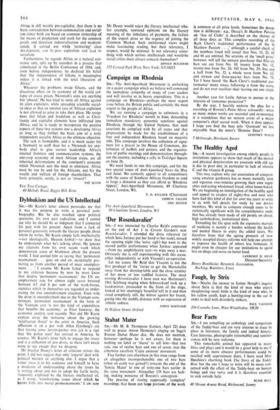Utterly Absurd
SIR,—Having returned from Ghana on March 5, I was interested to see Mr Szamuely's article of March I1 and Mrs Farthing's comment of April 8.
I first visited the Kwame Nkrumah Ideological Institute at Winneba, Ghana, in October 1964, after Mr Szamuely had already failed to return from leave. I was then employed there as a senior lec- turer from April 1965 until the coup (all lecturers, by the way. were `senior'—except for the very inexperienced). Mrs Farthing was, of course, mistaken in assum- ing Mr Szamuely to have been in Britain 'all these years.' But Mr Szamuely protests too much when he accuses her of 'casting aspersions.' in view of the fact that he. in a grand total of two columns, succeeds in piling on to Nkrumah such a compen- dium of vituperative terms as ' absurdity."pre- posterousness,"pretentious."fatuity."ridiculous; larcicality."totalitarian."grotesque caricature.' etc. No one, he tells us, 'knew what Nkrumah was.' and he quoted a definition which Nkrumah himself had superseded. He also alleged that Nkrumah'a book Consciezzcisnz 'proved' the need to unite Africa by 'inane mathematical formulae.' May I comment, having also been a 'senior lec- turer at the Kwame Nkrumah Ideological Insti- tute'? Nkrumah in April last year personally defined Nkrumaism as 'the application of scientific socialism to our African social milieu.' Even this definition is inadequate, since his study of 'two- colonialism' ranges far outside the territory of Africa. Consciencism is a book of seven chapters. The main argument is contained in the first six, and the seventh, a sort of appendix. uses the 'mathe- matical formulae' as an aid to those who find the condensation of principles to formulae to be helpful. Nkrumah's thesis is clear, even if you disagree with it. He accepts the scientific socialist view that, in capitalist society, a revolutionary change (whether violent or peaceful) is necessary to achieve socialism. This much he holds in common with. Communists. But in Africa, mainly pre-capitalist, he envisages a peaceful evolution from the time when the revolutionary change to independence is achieved to the time when socialism is established. He foresees such a development on the ground that Africa is still mainly pm-capitalist, that there is no basic contradiction between communalism and social- ism (since both are based on common ownership of the means of production and work for the common good), and therefore industrialisation and moderni- sation, if carried out while 'restricting' class development, can by-pass capitalism and lead to socialism.
Furthermore, he regards Africa as a natural eco- nomic unit, split up by outsiders in a process that culminated in the Berlin Conference of 1884, and, even before independence, he declared his belief that 'the independence of Ghana is meaningless unless it is linked with the total liberation of Africa.'
Whatever the problems inside Ghana, and the disastrous effect on its economy of the world col- lapse of cocoa prices, Nkrumah's aims are anything but 'absurd.' He has tried to unite all Africa against its alien exploiters, while spreading scientific social- ist ideas so that an internal race of African exploiters is not allowed to arise to take their place. He recog- nises that Islam and feudalism as well as Chris- tianity and capitalist elements have infiltrated into Africa, and he is ready to incorporate the positive aspects of these two systems into a developing Africa so long as they further the basic aim of a truly independent socialist Africa as the ultimate objective.
The task is formidable, and it is much easier for a Szamuely to scoff than for a Nkrumah (or any- body else) to give correct leadership. Africa's internal frontiers and communication systems, the one-crop economy of most African states, are all inherited deformations of the continent's economy which Nkrumah sees the need to eliminate. Africa must be run by and for the Africans, not for the wealth and welfare of foreign shareholders. That basic principle, surely, is not so 'absurd'!
40 Melody Road, Biggin Hill, Kent



































 Previous page
Previous page